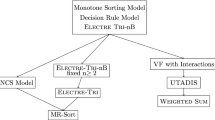Abstract
Multicriteria sorting methods aim at assigning alternatives to one of the predefined ordered categories. We consider a sorting method in which categories are defined by profiles separating consecutive categories. An alternative a is assigned to the lowest category for which a is at least as good as the lower profile of this category, for a majority of weighted criteria. This method, that we call MR-Sort, corresponds to a simplified version of ELECTRE Tri. To elicit the values for the profiles and weights, we consider a learning procedure. This procedure relies on a set of known assignment examples to find parameters compatible with these assignments. This is done using mathematical programming techniques.
The focus of this study is experimental. In order to test the mathematical formulation and the parameters learning method, we generate random samples of simulated alternatives. We perform experiments in view of answering the following questions: (a) assuming the learning set is generated using a MR-Sort model, is the learning method able to restore the original sorting model? (b) is the learning method able to do so even when the learning set contains errors? (c) is MR-Sort model able to represent a learning set generated with another sorting method, i.e. can the models be discriminated on an empirical basis?
Access this chapter
Tax calculation will be finalised at checkout
Purchases are for personal use only
Preview
Unable to display preview. Download preview PDF.
Similar content being viewed by others
References
Bouyssou, D., Marchant, T.: An axiomatic approach to noncompensatory sorting methods in MCDM, I: The case of two categories. European Journal of Operational Research 178(1), 217–245 (2007)
Bouyssou, D., Marchant, T.: An axiomatic approach to noncompensatory sorting methods in MCDM, II: More than two categories. European Journal of Operational Research 178(1), 246–276 (2007)
Bouyssou, D., Marchant, T., Pirlot, M., Tsoukiàs, A., Vincke, P.: Evaluation and decision models with multiple criteria: Stepping stones for the analyst, Boston. International Series in Operations Research and Management Science, vol. 86 (2006)
Cailloux, O., Meyer, P., Mousseau, V.: Eliciting Electre Tri category limits for a group of decision makers. Tech. rep., Laboratoire Génie Industriel, Ecole Centrale Paris (June 2011), Cahiers de recherche (2011-09)
Devaud, J., Groussaud, G., Jacquet-Lagrèze, E.: UTADIS: Une méthode de construction de fonctions d’utilité additives rendant compte de jugements globaux. In: European Working Group on MCDA, Bochum, Germany (1980)
Dias, L., Mousseau, V.: Inferring ELECTRE’s veto-related parameters from outranking examples. European Journal of Operational Research 170(1), 172–191 (2006)
Greco, S., Kadziński, M., Mousseau, V., Słowiński, R.: ELECTRE-GKMS: Robust ordinal regression for outranking methods. European Journal of Operational Research 214(10), 118–135 (2011)
Greco, S., Mousseau, V., Słowiński, R.: Ordinal regression revisited: multiple criteria ranking using a set of additive value functions. European Journal of Operational Research 191(2), 415–435 (2008)
Greco, S., Mousseau, V., Słowiński, R.: Multiple criteria sorting with a set of additive value functions. European Journal of Operational Research 207(3), 1455–1470 (2010)
Leroy, A.: Apprentissage des paramètres d’une méthode multicritère de tri ordonné, Master Thesis, Université de Mons, Faculté Polytechnique (2010)
Mousseau, V., Figueira, J., Naux, J.: Using assignment examples to infer weights for ELECTRE TRI method: Some experimental results. European Journal of Operational Research 130(2), 263–275 (2001)
Mousseau, V., Figueira, J., Naux, J.: Using assignment examples to infer weights for ELECTRE TRI method: Some experimental results. European Journal of Operational Research 130(2), 263–275 (2001)
Mousseau, V., Slowinski, R.: Inferring an ELECTRE TRI model from assignment examples. Journal of Global Optimization 12(2), 157–174 (1998)
Ngo The, A., Mousseau, V.: Using Assignment Examples to Infer Category Limits for the ELECTRE TRI Method. Journal of Multiple Criteria Decision Analysis 11(1), 29–43 (2002)
Pirlot, M., Schmitz, H., Meyer, P.: An empirical comparison of the expressiveness of the additive value function and the Choquet integral models for representing rankings. In: 25th Mini-EURO Conference Uncertainty and Robustness in Planning and Decision Making, URPDM 2010 (2010)
Roy, B., Bouyssou, D.: Aide multicritère à la décision: méthodes et cas. Economica Paris, Paris (1993)
Zopounidis, C., Doumpos, M.: PREFDIS: a multicriteria decision support system for sorting decision problems. Computers & Operations Research 27(7-8), 779–797 (2000)
Author information
Authors and Affiliations
Editor information
Editors and Affiliations
Rights and permissions
Copyright information
© 2011 Springer-Verlag Berlin Heidelberg
About this paper
Cite this paper
Leroy, A., Mousseau, V., Pirlot, M. (2011). Learning the Parameters of a Multiple Criteria Sorting Method. In: Brafman, R.I., Roberts, F.S., Tsoukiàs, A. (eds) Algorithmic Decision Theory. ADT 2011. Lecture Notes in Computer Science(), vol 6992. Springer, Berlin, Heidelberg. https://doi.org/10.1007/978-3-642-24873-3_17
Download citation
DOI: https://doi.org/10.1007/978-3-642-24873-3_17
Publisher Name: Springer, Berlin, Heidelberg
Print ISBN: 978-3-642-24872-6
Online ISBN: 978-3-642-24873-3
eBook Packages: Computer ScienceComputer Science (R0)




